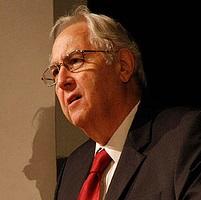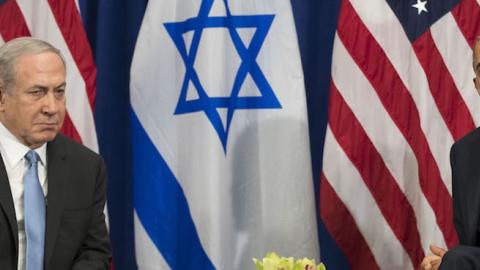By abstaining on the UN’s resolution condemning Israeli settlements, President Barack Obama gave Israel, on the eve of Hanukkah, a parting shot revealing his true views about the Jewish state. Pleas were made to him, by both the Israeli government and by President-elect Donald J. Trump, to continue long-standing American policy to veto such anti-Israel resolutions when they came before the Security Council, which would block the resolution from becoming official UN policy.
As one would expect, the resolution’s passage was hailed by so-called “liberal” Jewish groups like J Street, as well as openly pro-left and pro-Hamas groups such as Jewish Voice for Peace. J Street not only endorsed the resolution, but claimed that it “calls for a halt to actions by both sides that serve to undermine the prospects for peace.” Their statement goes on to equate “Palestinian incitement and terror” with “Israeli settlement expansion and home demolitions.” Jewish Voice for Peace praises the resolution’s adoption by the U.N. as “a step to acknowledging the “need to hold Israel accountable to international law.” There is no attempt on their part to engage in moral equivalence, seeing Israel alone as the one power responsible for the failure of an Israeli-Palestinian agreement.
The truth about the resolution, as Elliott Abrams and Michael Singh point out, is that it does not distinguish between construction in settlement blocs west of Israel’s security barrier where 80 percent of Israeli settlers live, and those built east of the barrier, where controversy exists about their existence. They point out that most settlements are in towns “that no one disputes [Israel] will keep” after a peace settlement. In essence the resolution demands a return to the 1967 lines before Israel’s military victory, which would mean that even the Western Wall as well as most of East Jerusalem would return to Palestinian hands.
By telling the U.S. Ambassador Samantha Power to abstain, President Obama made clear that he continues to believe the reason for failure to create a new Oslo Agreement was Israel’s alone. The Resolution in effect says that the areas of Jerusalem that were part of the ancient Jewish homeland, as Jonathan Tobin writes in Commentary, are all illegal settlements, thereby making its Jewish inhabitants international outlaws.
In her comments to the Security Council, Power argued that Israeli settlements hurt the chances for a two-state solution, and that “One has to make a choice between settlements and separation.” She emphasized that the resolution “also addressed counter-productive actions by the Palestinians.” Power is smart enough to know that these words mean nothing, since what the resolution does not ask is for the Palestinians to accept the legitimacy of the Jewish state, and to demand movement towards peace on their part by agreeing to give up the “right of return,” which, if took place, would mean a formal end to Israel’s existence. Rather than make a resolution to the conflict possible, all it accomplishes is to encourage the Palestinians to maintain their intransigence and their refusal to seriously negotiate with Israel.
President Obama does not appear to care that his abstention on the resolution has angered not only Republicans, but Democratic representatives in the House and the Senate. Even before the vote, The Hill reported, Democratic Senators Joe Manchin, Richard Blumenthal and Chris Coons asked the President to veto the resolution. New York’s liberal Senator Chuck Schumer also publicly called on the resolution to be blocked, and noted that he had asked the administration numerous times and “in the strongest possible terms” to veto it. "I am strongly opposed to the U.N. putting pressure on Israel through one-sided resolutions. An abstention is not good enough. The Administration must veto this resolution." Schumer well knows that the U.N., as he put it, “has long shown its anti-Israel bias.” After the resolution passed, Schumer added that “It is extremely frustrating, disappointing and confounding.”
After the Security Council of the U.N. passed the resolution, major Jewish groups condemned Obama’s turn on what had been a bipartisan policy. AIPAC, to which many prominent Democrats belong, stated that Obama “has taken action at odds with the bipartisan consensus in Congress and America’s long history of standing with Israel at the United Nations.” Moreover, it thanked President-elect Trump “who urged a veto.” The Anti-Defamation League, now headed by a former Obama administration member, said it was “outraged.” The Jewish Federations of North America called it “tragic” that the U.S. administration had chosen “to mar its legacy of support for the Jewish State and set back the prospects for Israeli-Palestinian peace” by abstaining rather than vote no on a resolution it described as “one-sided” and “anti-Israel.”
Speaking for the Conference of Presidents of Major American Jewish Organizations, executive vice-chairman Malcolm Hoenlein stated the passage of the resolution is shameful” and noted that “It is just going to embolden those who do not want a peace process.”
In effect, Barack Obama doesn’t seem to care about the opinions of prominent Democratic Senators or about those Democrats who could lose the support of Jewish voters in their districts. Rather, he has shown that he is more in tune with his party’s left-wing members, where anti-Israel sentiment flourishes.
Obama’s actions suggest that rather than lead to peace, the abstention and the resolution’s adoption will only embolden the Palestinian’s leaders to move away from any actual try at honest negotiations. Now, they will claim the U.N., representing the international community, stands behind them. It will also work to give new life to the B.D.S. movement that seeks to delegitimize Israel.
It is indeed, as Jonathan Tobin wrote, a “lame duck stab in the back of America’s only democratic ally in the Middle East.” It will also provide a stark comparison to President Donald J. Trump, who will restore a firm Israeli-American alliance that until now, had been bipartisan policy.














